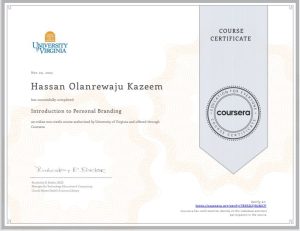The first Massive Open Online Course (MOOC) offered by the University of Virginia was a comprehensive course on personal branding. This course was not only impressive but also enlightening, providing valuable insights into the process of building a personal digital brand. The course content helped on how to build a reputable identity in the digital world such as Twitter. It demonstrated that building a personal brand is indeed achievable, and it outlined the necessary steps to do so.
In the course, I was introduced to the concept of the 80/20 rule, a principle that is crucial for effectively navigating various social media platforms. This rule, often referred to as the Pareto Principle, suggests that 80% of outcomes come from 20% of causes. In the context of social media, it implies that a significant portion of engagement is driven by a small fraction of one’s content or efforts.
The course also included a personality test, which I found to be an enlightening experience. This test allowed me to gain a deeper understanding of my personal traits and how they influence my interactions in the digital world.
Furthermore, the course provided important insights into digital privacy, a topic of increasing relevance in today’s interconnected world. It emphasized the importance of safeguarding personal information and maintaining privacy while interacting online. The knowledge and skills I acquired from this course significantly enhanced my digital identity and personal learning environment. I was able to refine my online presence and create a more impactful and authentic digital identity. 
About KAZEEM OLANREWAJU HASSAN
I am Kazeem Hassan, hailing from the vibrant and culturally rich country of Nigeria. I have a deep-seated passion for renewable and sustainable energy, a field that I believe holds the key to our the world's future. My interest in this area is not merely theoretical; I am actively engaged in expanding my knowledge and skills in this field. In essence, I am a passionate advocate for renewable and sustainable energy, currently furthering my education in this field with a specialized focus on the Circular Economy and its application in the Minerals and Construction materials sectors at the Universidad Politecnica de Madrid, Spain. I am eager to apply the knowledge and skills I am gaining to make a positive impact on our world.
